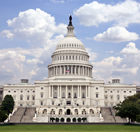
The 2% across-the-board Medicare cuts that would be triggered by a deficit-reduction committee failure to agree on an acceptable budget are preferable to the likely alternatives, a leading healthcare advisor has suggested.
Any plan that the super committee devises could involve much steeper aggregate cuts with farther-reaching impacts on Medicaid (which is shielded from the automatic cuts) and Medicare, according to a piece in the New England Journal of Medicine. Committee recommendations must be submitted by Nov. 23.
The article, written by former Clinton administration healthcare adviser Christopher Jennings, reasons that healthcare stakeholders, such as providers, patient groups and state governments, have a solid understanding of the impact of automatic cuts. They “are quite aware that Republicans would insist on much greater reductions to entitlements than the automatic cuts require, and they know that the Obama administration would have to spend healthcare negotiating chips to fulfill the president’s desire for an upfront middle-income tax cut and investment initiative designed to help jump-start the economy,” he writes.
Jennings says any real compromise should include policies that promote job growth, as well as payment and cost-sharing reforms that strengthen Medicare and Medicaid over the long term.
“The question is whether such a balanced approach is possible in our polarized political environment. For the moment, most seasoned political and policy analysts are concluding that it is not,” Jennings concludes.



